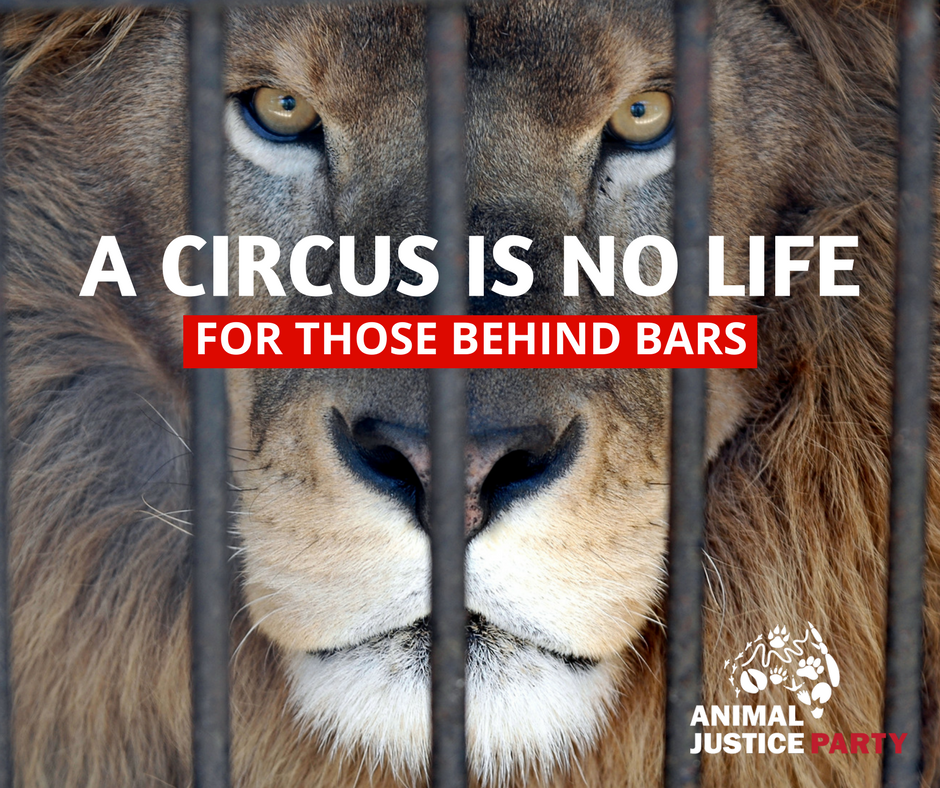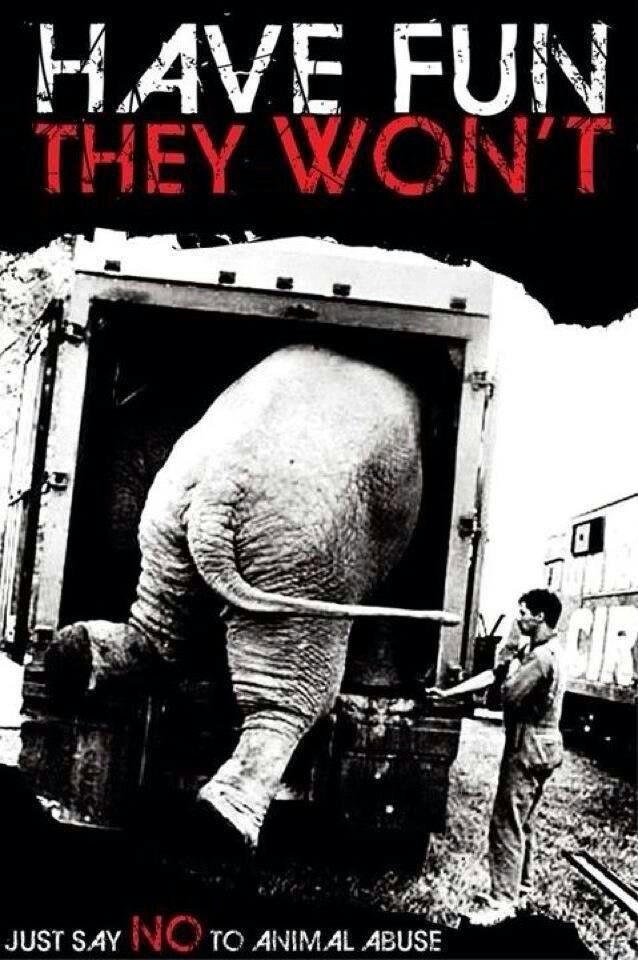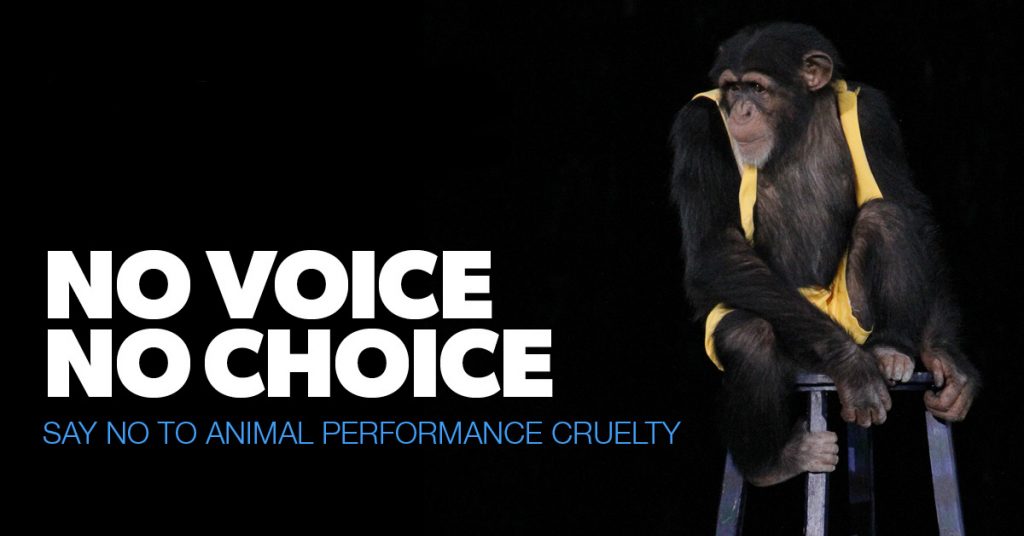
ANIMALS 101 – YOUR HOUR OR TWO OF FUN, MEANS A LIFETIME OF ENSLAVEMENT FOR THEM.
In light of the circus making their rounds across our country, we remind the public to make ethical choices when choosing their entertainment. Circuses that force animals to perform, are some of the most cruel shows on earth! Don’t support circuses that exploit animals for entertainment and greed.
While the sight of a lion jumping through fire, an elephant standing on its head, or a monkey riding a bicycle may seem entertaining to some, these animals have to suffer a lifetime of abuse, confinement, and stress.
Cruelty comes in many forms. Ever had a problem with someone chaining their dog, yet you take your children to the circus? Cruelty is not only physical abuse and you might be cruel to animals through neglect or by supporting certain practices, products or industries like the entertainment industry (circus, aquariums, petting farms, animals rides etc.)!
People tend to not think about the “behind the scenes” and welfare aspect of the animals when they go to enjoy the circus. No matter what the owners tell you and whether you think they are pampered or not, animals do not belong in the circus. It is what you can’t see that is the problem!

REASONS TO NOT SUPPORT THE CIRCUS!
- BORN IN CAPTIVITY & LACK OF OPPORTUNITY FOR NATURAL BEHAVIOUR.
Elephants, lions, tigers, and chimpanzees are all very social animals by nature, yet in the circus, these animals are taken away from their mothers at a very young age and brought up in a solitary environment where they cannot exhibit many of their natural behaviours. It removes animals from their natural habitat and social structure.
It involves the animal in performances that are foreign to their natural behaviour. It is not normal for a lion to jump through fire nor for an elephant to stand on its head. Many animals develop behavioural and/or health problems as a direct result of the captive life that they are forced to lead.
Also read: ANIMALS 101 – HOT WEATHER AND YOUR PETS
- THE DARK SIDE OF TRAINING
Training circus animals are often deliberately misrepresented to make it appear as though they perform because they like it, when in reality it’s because they have been conditioned to do so as the trainer commands, or face some form of abuse. Circuses and trainers may claim to uphold the best practices and to have the animal’s best interests at heart, but those of us in animal welfare, don’t buy that for one second. Big cats learn to obey commands because they’re afraid of being whipped.
The training of circus animals is a dark and disturbing world which is hidden from the public eye, however, many investigators have been able to film secret footage of the horrific ways in which trainers force their animals to learn the tricks they perform on stage. Bull hooks, whips, tight collars, muzzles, electric prods, and other barbaric tools are used to physically punish the animals until they learn to get it right. Bleeding, bruising, and even broken bones have been witnessed by investigators.

- TRAVEL, CHAINED & CAGED WITH LITTLE SPACE
While they’re being hauled around the country from venue to venue, animals may be crammed into tractor trailers for days on end. These trucks are usually cramped, filthy, sweltering, and poorly ventilated. An elephant named Heather died from heat exhaustion in a tractor trailer. When they are not training or performing, animals are kept chained or caged with little space to move in. Circus animals easily spend more than 90 percent of their lives behind bars.
The average circus travels for 48 weeks of the year, and during this time, the animals are all confined to tiny cages, only just big enough to stand and turn around in. In the wild, an elephant walks on average of 25 km per day, but can walk up to 195 km per day, highlighting the immense disparity between their cruel circus lifestyle and their natural one.

- MENTAL HEALTH
The wild animals commonly abused in circuses are extremely stressed by circus conditions. The loud noise of the music, the cheers of the crowd and the dizzying lights all disorientate and cause stress to these animals. These animals endure the rigors of transport, training and performances. With lack of space, socialization, training methods and stress of performing unnatural behaviour, it is very common for these animals to develop stress related illnesses, depression, anxiety, and extreme frustration when they are deprived of companionship.
Over prolonged periods this can result in abnormal behaviour patterns, which include, swaying, head-bobbing, and incessant pacing. Sometimes, they even harm themselves. They’re denied everything that gives their lives meaning, such as the opportunity to run, play, or socialize. Animals have snapped when they became overwhelmed by the stress of circus life, going on rampages and causing property damage and even human deaths and injuries. The animals often pay for this, with their lives.
- PHYSICAL LONG-TERM DISABILITIES
In addition to the above, the captive state which these poor animals experience, often leads to shorter lifespans and physical disabilities, due to a lack of any natural exercise and the extreme daily confinement. Joint problems are particularly common among elephants, lions, and tigers as they would naturally roam for kilometres, something which circus animals never get to experience.

When you purchase a ticket to a circus that exploits animals, you’re supporting their misery. Circus life is not good for animals and they should never be treated as products! They are sentient beings and deserve respect, care and most of all freedom. Taking your kids to the circus is not “just for fun or innocent”, it shows a lack of compassion and understanding. Captivity is not education!
WATCH this short video on the sad reality of animals in captivity.
What you can do – There are so many entertaining circuses that doesn’t exploit animals. Support them! Join a demonstration and encourage your friends and family members to shun animal circuses by sharing this information. Be an example for your kids.
DO THE RIGHT THING by not supporting this cruel industry and by reporting, to the SPCA, any welfare concerns you may notice when passing a circus.
Did you complain about lock down at any stage? This is how animals in the circus/captivity feel for their entire life! These animals have no voice and no choice. We will fight, not until cages are comfortable, but until they are empty!
Thanks for tuning in! Next week we will look at many reasons why you should sterilise your pets.
WHEN YOU KNOW BETTER, DO BETTER!
#NoToCircus #NeverBeSilent #BanAnimalCircuses #AnimalsAreNotProducts #DontBuyATicket